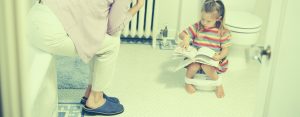
DOS AND DON’TS
DO’S AND DON’TS Don’t act under pressure Certain situations can cause parents to try and speed up the process. Perhaps the kid is about to
The toilet training process has a strong impact on how the child’s personality develops. Adequate behavior during that process is grounded on warmth, understanding, and patience, as well as conflict avoidance. All these help build the child’s trust and security in her parents, plus her self-image and self-confidence. Incorrect behavior can disrupt the kid’s developing personality and could also delay the toilet training process. It can emerge in a range of problems, including the ones I describe in this book.
To avoid mistakes and minimize problems as far as possible, I’m outlining several issues connected to the toilet training process. I want to start by noting that if I had to sum up this chapter’s message in one sentence, I would tell every parent:
Make sure the toilet training process is conflict-free!
Yet, if every parent complies with this, they’ll spare the child and themselves many hassles, complications, and problems.
Going diaper-free means transitioning from one habit to another. In modern society, we diaper newborn babies and “show them” the diaper is the place to do bodily functions, whenever and wherever they want. Later, after a year or more, when the child is living harmoniously with his “built-in” toilet, we change our instructions. No more pooping any time and any place. From here on out, it has to happen in one place—the toilet. It’s like a situation when we have to relearn our driving habits by halting at a green light and driving off at a red one! Or switching to driving on the left-hand side of the road instead of the right.
Many parents will agree that transitioning from one habit to another is tough for adults as well. Two tough challenges are changing our eating habits and quitting smoking. However smart we are. However we long to change. Know how important it is for our health. Know exactly what we should and what we should not eat, we still fail time after time. It must be so much more difficult for kids to change their habits.
Some kids pick up clear hints on the subject. They notice that their parents, siblings, kids at daycare, all go to the bathroom to poop, and the urge to be like them kicks in. For them, it’s pretty simple to transition from pooping in a diaper to using the toilet. But for another large group of children, it’s far from simple. They have a strong dependence on the diaper. They feel secure with it, and the idea of abandoning it can seem alarming.
The parents’ role in the challenge of transitioning from diaper to toilet is particularly difficult and complex. Parents are society’s agents, and it’s their task to instill social norms in their kids from the outset. Toilet training is one of the first such educational norms.
As they embark on the task, parents present their kids with new demands. They are facilitators and teachers who cheer on success and console in cases of failure. Yet, with their deep emotional involvement in the process, they must put their irritation and frustration aside. Thus, create a harmonious, supportive atmosphere.
When successful, it’s an experience that contributes immensely to forming the child’s image of her parents. Parents are authoritative but still supportive, helpful, protective, understanding and encouraging. But if the process fails, it can affect the image-formation.
For the kid, a smooth and harmonious transition means stronger self-confidence and self-image. Thus, a transition accompanied by conflict and irritation can delay the process. Also it can harm the child’s developing personality, self-image, and self-confidence.
The Child’s readiness or the Parent’s?
It’s widely accepted that the child’s readiness to go diaper-free is reflected in several areas. The physical aspect: the ability to identify physical message signals related to elimination, pressure on the bladder, pressure in the bowels.
Gross and fine motor skills: the ability to walk to the bathroom, clamber onto the trainer seat, remove and put on items of clothing, the skills to cope with buttons, Velcro and so on.
In the emotional area, the need to stop using diapers and imitate the adults around him, the urge for achievement, etc.
In the cognitive area, the capacity to understand, express, and communicate.
It’s generally agreed that in those aspects, most children are ready between 18 months and 2½ years. Yet, in other countries and ethnic groups, most kids are diaper-free even earlier. For instance, in Russia and Ethiopia, sometimes at 9 months. Clearly, children’s ability to acquire hygiene habits and control their elimination is present at the earliest months of life. To develop and activate it at an early age, what’s needed is the right approach plus the parents’ appropriate level of readiness.
The parents’ approach and readiness apparently determine the kind of process and how successful it will be. Parents have a crucial role in toilet training. They can make it uneventful and harmonious, or plagued with anger and frustration. For the utmost success, parents must launch the process when they’re available, ready, and armed with patience. Several principles ensure a positive, effective, and short experience that bolsters the child’s developing personality.
In most developed nations, health services track kids closely in early childhood. In terms of physical growth, motor skills, hearing, and speech, there are defined criteria and norms for each age and stage. There are methods of evaluation and treatment that are applied when necessary (physiotherapy, communications clinician, occupational therapy).
While toilet training is an aspect of the development process, there are no agreed-on norms and criteria for it, and no evaluation or treatment methods.
When other aspects of the development process are slow or delayed—children who walk or talk late, or whose growth-rate is slower—parents show empathy, understanding, and a warmly encouraging attitude. It’s unthinkable that in those situations parents would demand the child tries harder, put pressure on her, or show their disappointment when progress doesn’t match the norm.
Sadly, that’s not always what happens with toilet training. While it’s an area with lots of room for encouragement, and for applying direct and indirect pressure, there can also be reactions of disappointment, anger, or worse. Psychologically, it’s easier to help and encourage a child who’s having problems walking or talking—even though she’s at the “right” age—than relating like that to a child who can already use the toilet but has occasional soiling episodes—in her underwear, the car, or on the living-room couch.
Parental reactions originate in the discrepancy between what parents expect from the child and the child’s actual performance. So, parents need to maintain awareness of this and ignore opinions that say the child does it deliberately for the sake of control. Instead, they need to use intelligence, advance planning, and thinking.
Several dos and don’ts can help parents take a positive, constructive approach during the toilet training process.

DO’S AND DON’TS Don’t act under pressure Certain situations can cause parents to try and speed up the process. Perhaps the kid is about to

Guidelines for successful Potty Training and damage prevention The impact of parents behavior The toilet training process has a strong impact on how the child’s

POTTY TRAINING ON A WEEKEND This is an intensive focused program implemented by parents continuously over several days (we recommend on a long weekend or

Speed up the process of progressing from infant diapers to toilet chairs or toilet seats with The Magic Bowl App.

The Magic Bowl – potty training made easy Dr. Baruch Kushnir turns potty training into a fun, effective, and most importantly, short experience. Order Now

Encopresis – you can beat it! Game-changing solutions for Toilet Anxiety, Soiling, and Constipation in Children Order Now About the book How to eliminate poop